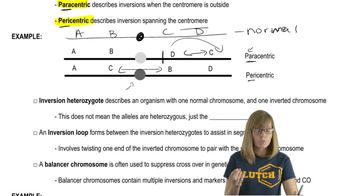Here are the essential concepts you must grasp in order to answer the question correctly.
Chromosomal Aberrations
Chromosomal aberrations refer to structural changes in chromosomes that can affect genetic information. These changes can include deletions, duplications, inversions, and translocations, which may lead to genetic disorders or impact an individual's health. Understanding these aberrations is crucial for interpreting genetic counseling results and assessing potential risks.
Recommended video:
Heterozygosity
Heterozygosity describes the presence of two different alleles at a specific gene locus on homologous chromosomes. In the context of chromosomal rearrangements, being heterozygous means that one chromosome carries the rearrangement while the other is normal. This genetic variation can influence the expression of traits and the likelihood of passing on genetic conditions.
Recommended video:
Karyotype Analysis
Karyotype analysis is a laboratory technique used to visualize an individual's chromosomes, allowing for the identification of chromosomal abnormalities. By comparing the karyotype of an individual with a standard reference, geneticists can detect variations such as rearrangements, which are critical for diagnosing genetic disorders and informing treatment options.
Recommended video:
 Verified step by step guidance
Verified step by step guidance Verified video answer for a similar problem:
Verified video answer for a similar problem:



 12:42m
12:42m